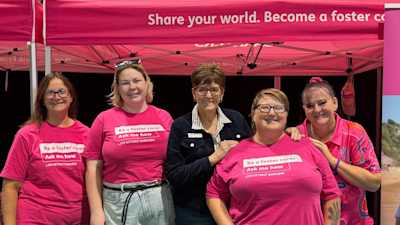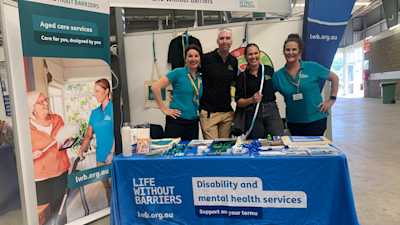May Marks Queensland Domestic and Family Violence Prevention Month (DFVP Month) Not now, not ever. Together.

During the month of May, Life Without Barriers continues to highlight our services in order to support domestic and family violence prevention in Queensland. In this feature, we look to possible responses if you find yourself in a situation where domestic or family violence is a reality.
Leaving an abusive relationship is not easy, especially if children are involved - it's often not safe to leave. If you are stuck in a violent home or relationship, here are some suggestions of ways to prepare for when you can leave:
Create signals for supportive neighbours, family or friends that alerts them to come over or call for help. This might include leaving on a certain light or a blind open, phoning or texting a friend with an agreed cue or safe word.
Keep essential items like spare keys or copies of important documents handy in an accessible spot so you can grab them quickly if needed. Have a plan that you’ve practiced to get yourself and any children out of the house safely.
Teach your children that their only responsibility during an incident is to stay safe and not try to rescue you.
We know this can be the hardest of all, but please let people know about your situation so they can help you make an exit when needed.
Being in a domestic violence situation is hard enough, but when you have children it can be even more difficult and complicated. Helping children recover from domestic violence can take many forms. Some of them might be:
Whenever possible, when you can sense negative behaviours escalating with your partner, take children to a safe place.
Reassure your children that the violence is not their fault in any way.
Encourage them to talk about their feelings and provide as much emotional support as you can.
Get extra support for your children – their schools are a safe place to start.
Enlist the help of a professional to help provide children with emotional support.

Image: Tadeusz Lakota on Unsplash
It’s not always possible to take your animal with you when fleeing an abusive home, especially during a crisis. But if you can, there are groups ready to help you all get out safely.
Refuges and shelters are increasingly being designed to accommodate pets.
Services vary state to state, and 1800RESPECT can point you in the right direction.
The RSPCA Queensland’s Pets in Crisis program can find temporary housing the pets of people entering a refuge.
If an animal shelter or pet-friendly refuge is not an option or something you’re not comfortable with, reach out to family and friends.
Finding accommodation for your pet when escaping a violent relationship is one part of a safety plan.
If you are planning to leave:
Hide a bag for yourself and any children with all the necessary important items and any documents that you’ll need and leave it with someone you trust, or in a safe place.
If you can, put some money aside for immediate expenses when you leave.
Transfer your phone contacts directly to your phone so you can change your phone number without losing important contact information.
Take small items you may be able to sell, like jewellery.
Contact the agencies that help in the planning (call 1800 737 732 for help).

If you have acted on your decision and you have left, this time can be very dangerous. Here are some tips to reduce the risk and keep you as safe as possible.
Report your situation to the Police and apply for an ADVO.
Ensure that you let the school and/or workplace know about the ADVO and share a photo of your partner.
Redirect your mail where you can.
Get a new SIM and set your call preferences to “private” so your new number cannot be saved.
Only give out your new address and phone number to people you trust and who know not to share it with the perpetrator.
Ensure you are staying safe by changing routines.
Most importantly, seek support during this time from services that specialise in domestic and family violence. In QLD call 1800 811 811 or nationally 1800 737 732 .
IMPORTANT INFO
Check your phone for spyware via Wesnet or Techsafety
If you are in danger, don’t feel safe, or fear for someone else’s safety, call Triple Zero (000) immediately and ask for police.
For non-urgent police assistance, phone Policelink on 131 444.
If you wish to speak with someone about domestic and family violence, you can contact
DVConnect Womensline on 1800 811 811
DVConnect Mensline on 1800 600 636
1800 RESPECT on 1800 737 732
If you wish to speak to someone about your mental health and wellbeing, you can contact:
Beyond Blue 1300 22 4636
Lifeline on 13 11 14
Mensline Australia on 1300 78 99 78


